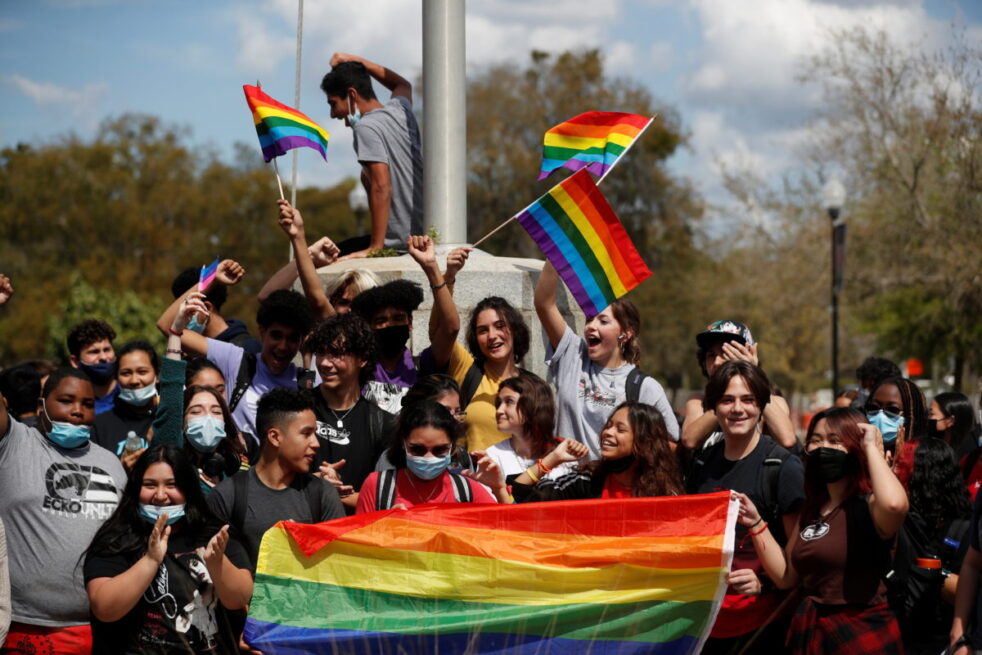Although many LGBTQ+ rights have been fought for and won over the years, recent movements in many state legislatures have focused on assailing a more vulnerable group: LGBTQ+ youth.
A surge in anti-LGBTQ+ legislation began earlier this decade, with the Washington Post noting at least 10 new laws being passed across the country last year that targeted students. These can affect all aspects of students’ educational experiences, from high school sports to sexual education to simple classroom discussions.
The Movement Advancement Project (MAP) monitors the status of curriculum laws in different states, which are acts that dictate LGBTQ+ inclusion or exclusion from statewide school curricula. As of May 30, MAP reports that 10 states have laws that censor discussions of LGBTQ+ people or issues in classrooms.
A notable example of this censorship is in Florida, where its legislature passed House Bill 1557, or the Parental Rights in Education Act. Governor Ron DeSantis signed the bill into law in March 2022, including its infamous clause that “prohibits classroom discussion about sexual orientation or gender identity in certain grade levels.” In May 2023, the Florida Board of Education expanded the original law to prohibit discussions in all grade levels outside of health or reproductive courses.
Other states have implemented similar legislation to Florida’s. For example, Arkansas enacted Act 237 in March 2023 which bars classroom instruction on gender identity or sexual orientation for students in fifth grade or below. While stifling discussion on LGBTQ+ issues, the act also bans teaching related to critical race theory in Arkansas schools, launching a multipronged attack on what is taught in the classrooms.
States like South Dakota lack anti-LGBTQ+ curriculum laws but have other legislation like House Bill 1217, which oversees participation in school sports. This legislation limits participation in women’s sports teams to only those assigned female at birth but poses no restrictions on men’s sports. While school staff are not allowed to report violations of this law, it empowers private citizens in South Dakota to sue schools where its provisions are not followed.
In addition to direct anti-LGBTQ+ laws, some states have adopted legislation that requires parents to be notified if LGBTQ+ subjects are being taught in their children’s schools and allows them to opt their child out of instruction.
MAP also notes states that have had anti-LGBTQ+ curriculum laws in the past but have since repealed them. However, the resurgence in discriminatory laws in public schools has caused renewed efforts in some to stifle discussion of LGBTQ+ issues. For example, MAP reports that North Carolina repealed an anti-LGBTQ+ law in 2006, but the state senate passed a bill in February that prohibits instruction on gender identity in elementary schools.
While there is variability in the provisions and enforcement of anti-LGBTQ+ laws in public schools, their effects are largely harmful to the students they target. As noted by the Washington Post, “these bills will only harm students who already are vulnerable to discrimination and a lack of institutional and familial support,” and the laws’ effects are still yet to be fully realized in many states.
Just before the surge of new bills, the organization GLSEN released its 2021 National School Climate Survey report, which provides data on the experiences of LGBTQ+ youth in schools. The organization found that 58.9% of LGBTQ+ students experienced discriminatory policies or practices in school, with the majority discriminating against students’ gender. These practices can contribute to LGBTQ+ students feeling unsafe and missing school to avoid uncomfortable environments.
Most of these new anti-LGBTQ+ laws have not been in effect for long, but there are already instances of their enforcement affecting students and teachers. In early May, Florida teacher Jenna Barbee showed her fifth-grade class the animated movie “Strange World,” which features a gay character. Despite no sexual content being shown in the movie, a parent reported Barbee to the school board for violating the Parental Rights in Education Act, launching an investigation that could lead to her suspension or the revocation of her teaching license. Barbee preemptively resigned from her position to avoid repercussions from the incident.
While the number of anti-LGBTQ+ laws has been on the rise, public outcry against them has also been bubbling to protect LGBTQ+ children inside and outside of the classroom. Although some states are taking steps backward regarding to LGBTQ+ education, MAP reported that seven states require LGBTQ+ inclusion in state curricula to help validate and support the youth in those school systems.
GLSEN also noted in its 2021 report that having supportive faculty, staff and student organizations is critical to improving the experiences of LGBTQ+ students, and eliminating discriminatory policies is a pivotal first step in creating these supportive environments and ensuring the safety of LGBTQ+ youth in their educational experiences.
